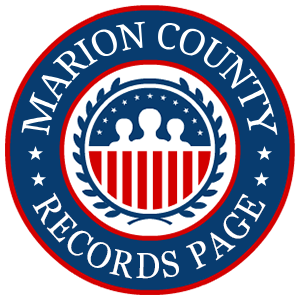Search free Marion County divorce records to find out if someone has dissolved their marriage locally.
Record custodians often allow members of the public to check public records — including divorces — via various methods and without incurring any fees. Online databases offer conveniently accessible lookup options as well.
Check out divorce details in Marion County, Florida, today by following the guidance and links found throughout this resource.
How To Access Marion County Divorce Records at No Cost
A divorce in Florida is called a dissolution of marriage.
Parties only need to demonstrate that the marriage is irretrievably broken, and a family court will order a dissolution upon settling all disputed matters. The court that hears divorce cases in Marion County is the 5th District Circuit Court.
Marion County 5th Circuit District Court
110 N.W. 1st Ave.
Ocala, Florida 34475
Phone: 352.671.5604
When you want to access divorce records from cases heard in a court of law, you should always look to the clerk of the court. The Marion County Clerk of Court and Comptroller is the records custodian of all family law cases resolved by the 5th District Circuit Court.
The fastest way to check on whether someone has obtained a dissolution of marriage is through the Marion County Online Court Records Search tool.1 This interface allows anyone to access court case records, including divorces, at no cost. A user may also search the database anonymously.
If you do not wish to register an account on the system, simply select ‘Public’, and you will be able to search court records anonymously. There is a disclaimer concerning the use of the information contained in the database, waiving the Marion County Clerk’s liability if the information is used wrongfully.
It also warns that any information contained in the database has no legal force or effect. Only official copies of records from the court may suffice for official or legal purposes.
Once you’re in the database you can perform a search for court records by entering the name of an individual or by case number. It is unlikely that you would have the case number, so searching by name is your best bet.
Since you will be searching for dissolution of marriage case records, you will want to exclude all other cases. You can do this by navigating to the ‘Court Type’ section and checking ‘Domestic Relations/Family’.
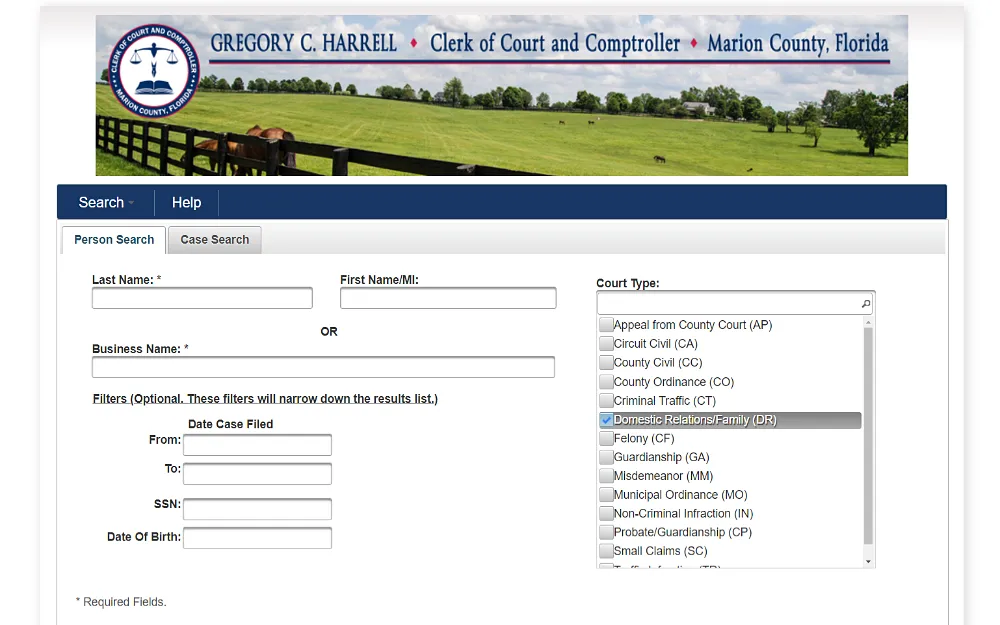
You will then want to enter the last and first name of one of the parties to the divorce. If you also have a date of birth or date range of when the dissolution took place, that will further narrow the search to the most accurate results.
Once you hit the search button, the results page will provide a list of individuals who share a common name with the one you entered in the search.
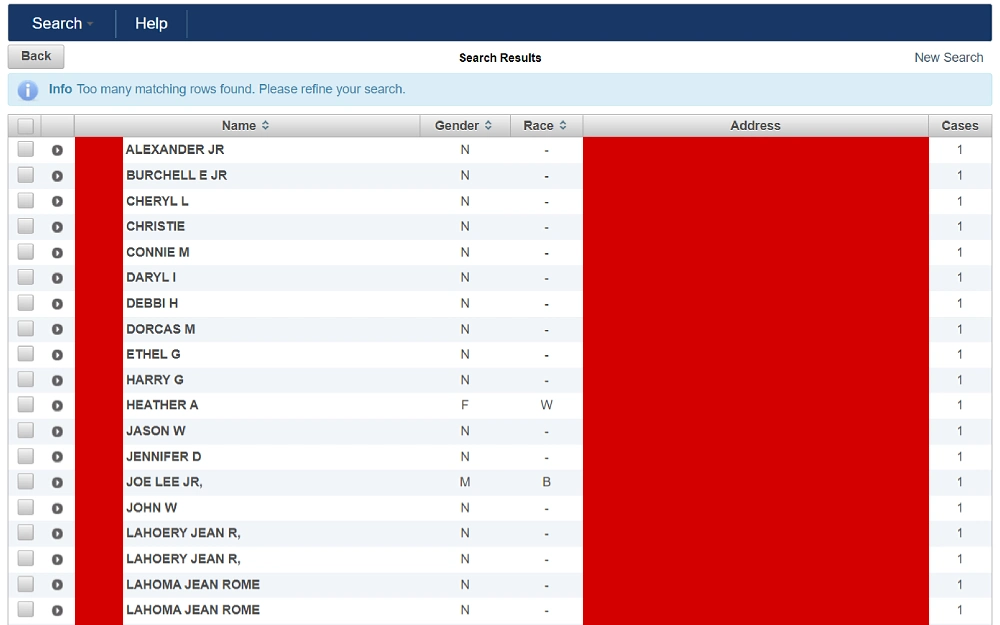
The middle name (if available), gender, race, and address columns should help you locate the correct person. Once located, click on the arrow beside their name.
A drop-down will display all domestic relations and family cases involving the individual. If it is a dissolution, you will see the name of the other party to the divorce.
One of the parties will be the ‘Respondent,’ and the other will be the ‘Petitioner’. A petitioner is the spouse who initiates divorce proceedings while the other spouse responds.
To view information concerning a particular divorce case, click on the ‘UCN’, which is the court case number. The description of the case will read ‘Dissolution of Marriage’. You will be able to view the court case events, filing date, judgment date, status, and whether or not it was contested.
If you wish to obtain copies of public divorce records, you can do so through the Marion County Clerk’s Record Center. There are no clear instructions on how to make a request.
However, the Florida Attorney General’s Office provides that you have a right to inspect and copy public records. If you are denied, you have a right to ask for the statutory reason.
Generally, a request for public records is made by submitting a request, either in person, over the phone, by email, or by mail. The request should include your name, contact information, and a description of the records you want to copy or inspect. There are usually fees associated with making copies.
If you wish to mail, send to this address:
Marion County Clerk of Court
P.O. Box 1030
Ocala, FL 34478
Otherwise, you may visit, email, or call the office at the address below. The office is open from 8:00 a.m. to 5:00 p.m., Monday through Friday.
Marion County Clerk of Court & Comptroller
110 N.W. 1st Ave.
Ocala, FL 34475
Phone: 352.671.5555
Email: [email protected]
Florida does not recognize common law marriage. Therefore, it does not recognize common law divorce. For a dissolution to be effective, parties must abide by the divorce law prescribed by Florida Statute 61.
City and local governments also serve as custodians of public records. Municipalities also maintain their own courts.
However, no municipalities in Marion County offer services pertaining to dissolutions of marriage. You must contact the Marion County Clerk of Court & Comptroller or a state resource, as explained below.2
Search Divorce Records at the State Level via the Florida Department of Health Bureau of Vital Statistics
After a divorce is finalized by a circuit court’s family court, the dissolution of marriage is sent to the Florida Department of Health Bureau of Vital Statistics within 60 days.3
Members of the public may order a divorce certificate that proves that a dissolution of marriage occurred. This is distinguished from a decree, which may only be obtained from the clerk’s office in the county where the dissolution was granted.
Interested persons can order a certificate of divorce in person, by mail, or online through a third-party provider endorsed by the Bureau. Whether ordering a certificate of divorce in person or by mail, you must complete an Application for Florida Dissolution of Marriage Certificate.4
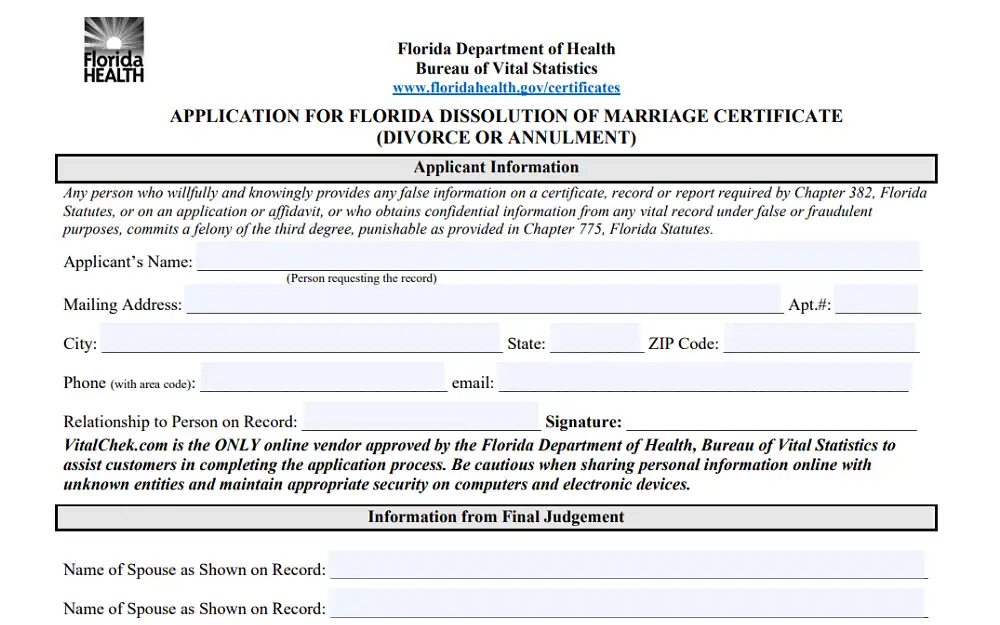
You are required to provide your name, address, phone, email, relationship to the person on the record, and signature. It should be noted that you do not have to be related to anyone on the divorce record, as dissolution of marriage certificates are public records. Additionally, provide the name of both spouses, date of dissolution, and county where it was granted.
The first certificate is $5, which also includes the search fee. Additional certificates cost $4.
If you do not know the date when the divorce took place, you may be charged $2 for each year additional year searched.
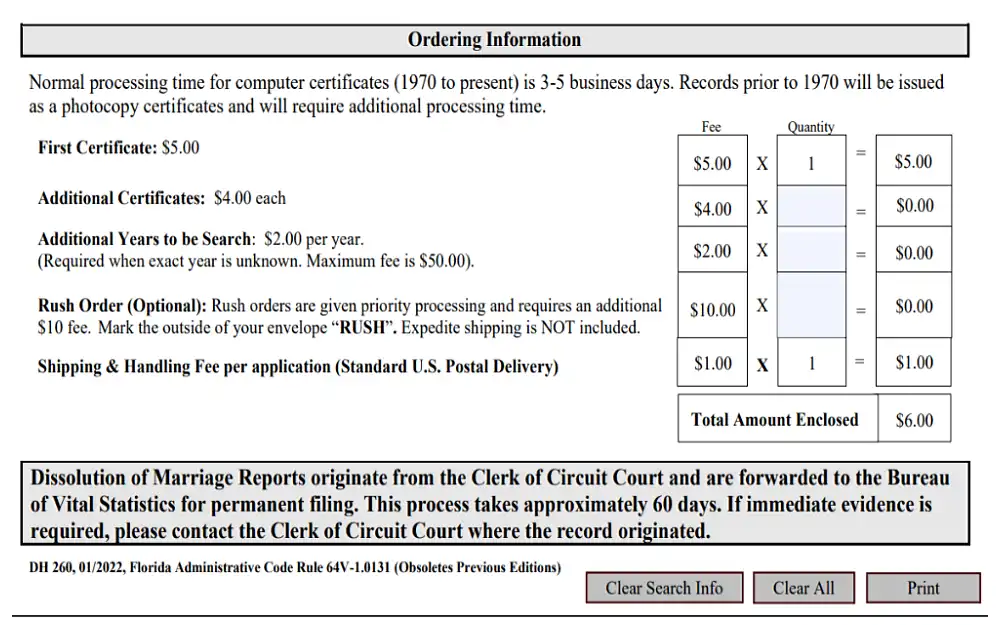
If mailing an application, payment may only be made by check or money order made payable to the ‘Florida Bureau of Vital Statistics’.
Walk-in service is conducted at 1217 N. Pearl Street, Jacksonville, FL 32331, between 8:00 a.m. to 4:30 p.m.
Mailed applications must be sent to:
Florida Department of Health Bureau of Vital Statistics
Attn: Vital Records Section
Post Office Box 210
Jacksonville, Florida 32231
Phone: 904.359.6900
Email: [email protected]
Alternatively, you may order a certificate online through VitalChek, a third-party provider. VitalChek also allows interested persons to order over the phone by calling +1.877.550.7330.
Marion County nor Florida offer divorce index records. You should contact a third party if you wish to track down historical divorce records for genealogy or research purposes.
Can Anyone in Marion County Search Public Divorce Records?
Divorce records are part of the state’s vital records. The law concerning divorce records can be found in Florida Statute 382.025(2).5
The law provides that the Florida Department of Health must issue dissolution of marriage records to any person making a request and payment of the fee. There are no pertinent exceptions.
Additionally, because a dissolution of marriage is a court proceeding, the files from the case are public records. The laws governing the disclosure of public records are found in Florida Statute 119.6 Public records are defined as all documents and papers made or received in connection with the official business of any government agency.
Because court records are documents and papers created by the court or received in a filing by a party in the ordinary course of court business, the records are public. The law further provides that public records are available to be inspected and copied by any person. There are several exceptions to the disclosure of public records, but none apply to court records.
The law specifically addressing court records is Florida Statute 119.0714(2). Anyone may inspect and copy court records. The court will only redact personal information like a social security number if a redaction is requested.
The court records surrounding a dissolution of marriage are the divorce papers and decrees. While the papers are the initial filings, the divorce decree is the final judgment.
In the event that the state government and Marion County cannot offer the services you require, a third-party provider may be an option. Although none of the records you receive from an un-endorsed third party cannot be used for an official purpose, they may assist you in your research.
Marion County divorce records are widely available to anyone who makes a request; use the linked search tools throughout this resource to find these records without hassle.
References
1Marion County Clerk of Court and Comptroller. (2024). Online Court Records Search. Retrieved April 09, 2024, from <https://www.civitekflorida.com/ocrs/county/42/>
2Marion County Clerk of Court and Comptroller. (n.d.). Locations & Mailing Addresses. Retrieved April 09, 2024, from <https://www.marioncountyclerk.org/about/locations-mailing-addresses/>
3Florida Department of Health, Bureau of Vital Statistics. (2024, February 28). Divorce. Retrieved April 09, 2024, from <https://www.floridahealth.gov/certificates/certificates/divorce/index.html>
4Florida Department of Health, Bureau of Vital Statistics. (2023, June 30). Application for Florida Dissolution of Marriage Certificate. Retrieved April 09, 2024, from <https://www.floridahealth.gov/certificates/certificates/marriage/_documents/DH260-diss-marr-app-6-30-2023.pdf>
5The Florida Legislature. (2023). Statutes & Constitution: Chapter 382 Vital Statistics. Retrieved April 09, 2024, from <http://www.leg.state.fl.us/statutes/index.cfm?App_mode=Display_Statute&URL=0300-0399/0382/Sections/0382.025.html>
6The Florida Legislature. (2023). Statutes & Constitution: Chapter 119 Public Records. Retrieved April 09, 2024, from <http://www.leg.state.fl.us/statutes/index.cfm?App_mode=Display_Statute&URL=0100-0199/0119/0119.html>
